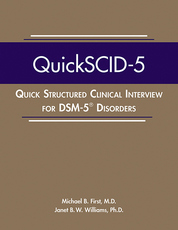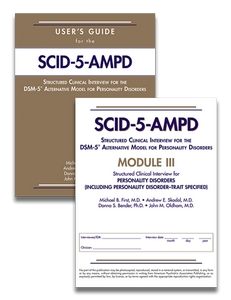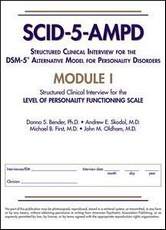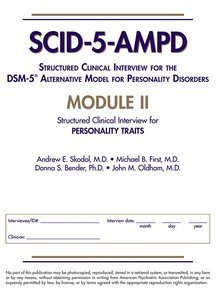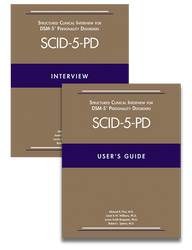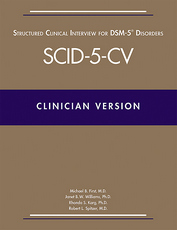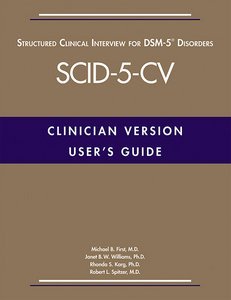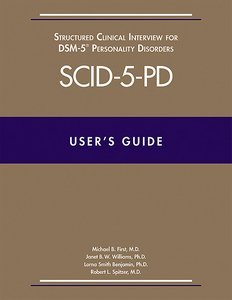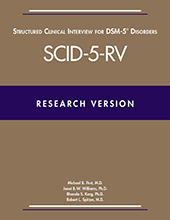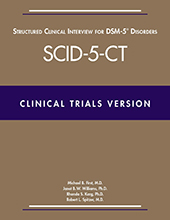About the SCID-5
The Structured Clinical Interview for DSM-5 (SCID-5) is a semistructured interview guide for making the major DSM-5 diagnoses. It is administered by a clinician or trained mental health professional who is familiar with the DSM-5 classification and diagnostic criteria. The interview subjects may be either psychiatric or general medical patients—or individuals who do not identify themselves as patients, such as participants in a community survey of mental illness or family members of psychiatric patients.
Three different versions of the SCID-5 are available for diagnosing the major DSM-5 diagnoses; two SCID-5 versions are available to assess personality disorders as presented in DSM-5.
Why Use SCID-5?
- To ensure that the major DSM-5 diagnoses are systematically evaluated. For example, the SCID can be used in clinical intake procedures or in comprehensive forensic diagnostic evaluation.
- To select a study population. For example, in a study of the effectiveness of a treatment for depression, the SCID-5 can be used to ensure that all of the study subjects have symptoms that meet the DSM-5 criteria for Major Depressive Disorder and that all of the subjects with a history of any Substance Use Disorder in the past 12 months are excluded.
- To characterize a study population in terms of current and previous psychiatric diagnoses. For example, the diagnostic data that have been obtained using the SCID interview can be utilized by researchers, practitioners, policy makers, and the general public that are interested in prevalence and incidence estimates of psychiatric disorders among certain populations.
- To improve interviewing skills of students in the mental health professions, including psychiatry, psychology, social work, and psychiatric nursing. For example, the SCID can provide trainees with a repertoire of useful questions to elicit information from a patient that will be the basis for making judgments about the diagnostic criteria. Through repeated administrations of the SCID, students will become familiar with the DSM-5 criteria and at the same time will incorporate useful questions into their own interviewing repertoire.
Frequently Asked Questions
What kinds of subjects can be diagnosed using the SCID-5?
In addition to assessment of current psychiatric patients, the SCID-5 has been used to assess lifetime psychiatric diagnoses in medical patients, family members, community samples, college students, the homeless, the elderly, and in short, any adult who is able to participate in the interview. If the SCID-5 is being administered to an individual who does not self-identify as a psychiatric patient, (e.g., medical patients or subjects in a community study), the Non-Patient Version of the Overview in the SCID-5-RV edition should be used.
Although the vast majority of SCID studies have been administered with adults, some investigators have successfully administered the SCID to adolescents. A SCID-5 version specifically tailored for children and adolescents is currently under development.
While it is often not possible to administer the SCID-5 interview to subjects who have moderate or severe intellectual disability or who are otherwise too cognitively impaired to answer the questions, or to subjects who are too medically or psychiatrically ill to participate in an interview, the SCID-5 can still be used as a tool for gathering and documenting diagnostic information obtained from other sources (e.g., informants, previous records) with the application of the DSM-5 diagnostic algorithms.
SCID Versions
What are the differences between the various versions of the SCID-5?
See each versions description. Or, download the following documents:
Which SCID-5 version is best suited for my purposes?
When used to help guide the evaluation of non-personality disorders in clinical or forensic settings, or for training purposes (e.g., to improve diagnostic interviewing skills), the SCID-5-CV is the recommended version.
When the SCID-5 is being used for research purposes, the recommended version depends on the diagnostic needs of the research study. The various versions of the SCID-5 differ both in terms of which diagnoses, specifiers, and subtypes are covered and the assessment time frames (i.e., current vs. lifetime).
Specifically, we recommend these products for the following circumstances:
(Clinician Version)
(Research Version)
- If the range of diagnoses covered in the SCID-5-CV is insufficient (for instance because a Non-Patient Version of the Overview is needed or the assessment of certain disorders of interest are needed but omitted from the SCID-5-CV, such as Eating Disorders), then the SCID-5-RV is recommended.
- If the study requirements include making modifications such as omitting certain disorders, changing the order in which disorders are assessed, or altering diagnostic time frames, the SCID-5-RV is the only instrument that allows for such customization.
(Clinical Trials Version)
(Personality Disorders)
(Alternative Model for Personality Disorders)
Another consideration is whether a computer-assisted version of the SCID-5 is desired. If so, see the electronic versions of SCID-5 by clicking the link below.
Are there any electronic versions of the SCID-5 available?
Yes, currently there are two electronic SCID-5 products available from companies which have licensed SCID-5 from APA Publishing.
- NetSCID-5
The NetSCID-5 products are the first web-based, fully computerized versions of the SCID-5 instruments. A free webinar demonstration is available through TeleSage Inc..
- eInterview
Sunilion Software’s eInterview for SCID-5-RV is a desktop software designed to run on most Windows-based devices. For more information and to download a free trial of the software platform, please visit sunilionsoftware.com or contact [email protected].
Are there SCID-5 language translations available?
Yes, the SCID-5 products originally developed in English have been translated by different international publishers, and many, but not all, of the SCID-5 versions are available in languages other than English. Below is a list of the language translations of specific SCID-5 versions (SCID-5-RV, SCID-5-CV, SCID-5-PD) available. Individuals who are interested in obtaining product or order information are to contact the selected publisher directly.
Publishers who wish to obtain information about translating the SCID-5 products in a language not already included on the SCID-5 Translations list should email our foreign translations agent, John Scott & Co.
What are the differences between the SCID-5 and SCID-IV?
There are a number of significant differences between the SCID-5 and the SCID-IV. Explore a summary of differences between the SCID-5 and SCID-IV
Administering the SCID-5
Can the SCID-5 be administered to children?
The language and diagnostic coverage make the SCID-5 most appropriate for use with adults (age 18 and over). With slight modification to the wording of the questions, the SCID-5 may be administered with adolescents. Plans are underway to develop a SCID-5 version specifically tailored for children and adolescents, which will include self and parent/guardian reporting features.
What are the qualifications needed to administer the SCID-5?
The SCID-5 is designed to be administered by mental health professionals or researchers who have been clinically trained. There is no minimum degree requirement—the amount of clinical experience is the more crucial requirement. Ideally, SCID-5 users should have had sufficient clinical experience to be able to perform unstructured diagnostic evaluation. However, nonclinicians who have comprehensive diagnostic experience with a particular study population may be trained to administer the SCID-5. Generally additional training is required for individuals with less clinical experience.
How long does it take to administer the SCID-5?
The SCID-5 administration time varies significantly based on a number of factors. These factors include the SCID-5 version to be used (e.g., core vs. enhanced SCID-5-RV; SCID-5-RV vs. SCID-5-CV vs. SCID-5-CT), the number of disorders being assessed, the diagnostic complexity of the subject, the subject’s ability or lack thereof to succinctly describe his or her history and symptoms, and the user’s level of familiarity and experience with DSM-5 diagnostic criteria and the SCID-5 instrument selected. With this in mind, the following is a general range of administration times for each SCID-5 version. Subjects with complex psychopathology, diagnostic comorbidity, and who are difficult to interview may take longer than the maximum administration times listed below.
| SCID-5 Version | Range of Administration Time |
|---|---|
| SCID-5-RV Core Version | 45 to 120 minutes |
| SCID-5-RV Enhanced Version | 45 to 180 minutes |
| SCID-5-CV | 30 to 120 minutes |
| SCID-5-CT | 30 to 75 minutes |
| SCID-5-PD | 30 to 120 minutes |
Additional Support and Materials
What kind of training materials and services are available for the different SCID-5 versions?
- User's Guide
Each version of the SCID-5 has an accompanying User’s Guide that includes general instructions on how to administer the SCID-5 as well as extensive disorder-specific guidelines. It is essential for any user of the SCID-5 to have reviewed the User’s Guide prior to administration.
- Other SCID-5 Training Materials
Training materials are currently in development. For more information, visit www.scid5.org/training.
- On-site SCID-5 Training
On-site training is offered by Dr. Michael First. For more information, visit www.scid5.org/training.
- Off-site SCID-5 Supervision
For more information, visit www.scid5.org.
Are there reliability and validity data available on the SCID-5?
Presently, there is no reliability or validity data available for the SCID-5, other than the validation of the NetSCID-5 products. Information on prior versions of the SCID-I and SCID-II can be found by visiting the Psychometrics tab at www.SCID4.org.
How do I reference the SCID-5?
Each SCID-5 version has a specific citation. See all SCID-5 Citations
How do I obtain SCID-5 updates and revisions?
Given the complexity of the SCID-5 instruments, subsequent errors and updates are inevitable. A PDF document that includes a list of errors found, the affected module; page; or field code, and a detailed explanation on how to update the SCID-5 will be made available here as well as on www.SCID5.org online periodically for download. Additionally, the latest updates to the SCID-5-RV will be available here. Download the latest update for SCID-5-RV (July 2017)
The process to order the SCID-5 differs by version and may require a permission fee based on type of use (e.g., noncommercial, funded research or pharmaceutical trial). Please contact APA Publishing online if you have additional questions.
How do I order the version I need? Explore the products listed below, or view a table of ordering information for each SCID-5 version
| SCID-5 Instrument | Version | User’s Guide and Other Information | Format | Availability |
|---|---|---|---|---|
| SCID-5-RV | Research | User’s Guide Licensed Together | Distributed as:
|
The SCID-5-RV and the SCID-5-CT are available by permission only. Customers will need to pay the permission fee to use the SCID-5 instrument in their specific research study, clinical trial, training course, and others. Please submit your permissions request by filling out sections I, II, IV and VI of our web form: SCID-5 Request Form You will receive a quote via e-mail. The permission fee is based on the intended use of the SCID-5. Thus, permission needs to be procured for each research study, each clinical trial, and each training course period. |
| SCID-5-CV | Clinician | A separate SCID-5-CV User’s Guide is available | Package of 5 bound interviews SCID-5-CV and User’s Guide also sold as a set |
SCID-5-CV available from APA Publishing |
| SCID-5-CT | Clinical Trials | User’s Guide Licensed Together | Distributed as:
|
The SCID-5-RV and the SCID-5-CT are available by permission only. Customers will need to pay the permission fee to use the SCID-5 instrument in their specific research study, clinical trial, training course, and others. Please submit your permissions request by filling out sections I, II, IV and VI of our web form: SCID-5 Request Form You will receive a quote via e-mail. The permission fee is based on the intended use of the SCID-5. Thus, permission needs to be procured for each research study, each clinical trial, and each training course period. |
| SCID-5-PD | Personality Disorders | A separate SCID-5-PD User’s Guide is available. SCID-5-SPQ, self-screening tool is a included with the SCID-5-PD. |
Package of 5 bound interviews (SCID-5-PD plus SCID-5-SPQ) SCID-5-PD, SCID-5-SPQ, and User’s Guide also sold as a set |
SCID-5-PD available from APA Publishing |
| SCID-5-AMPD | Alternative Model for Personality Disorders | A separate SCID-5-AMPD User’s Guide is available. | Package of 5 bound interviews for each module (Module I, Module II, or Module III) Customized sets available of
|
SCID-5-AMPD available from APA Publishing |
| QuickSCID-5 | Quick | No user's guide needed. | Single booklet with licensed content. | QuickSCID-5 available from APA Publishing A purchase of the print book includes a license to photocopy for private clinical assessment use, up to 200 total copies per customer. For additional licensing or more information, please see: SCID-5 Request Form |
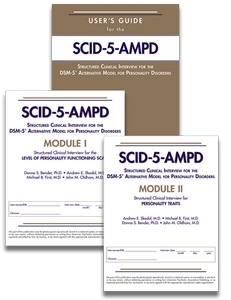
SCID-5-AMPD
The SCID-5-AMPD is a semistructured diagnostic interview that guides assessment of the defining DSM-5 Alternative Model for Personality Disorders components, which provides dimensional and categorical approaches to personality disorder diagnosis. Designed for trained clinicians with a basic knowledge of the concepts of personality and personality psychopathology, the modular format of the SCID-5-AMPD allows the researcher or clinician to focus on those aspects of the Alternative Model of most interest.
Each component is available individually or in customized sets.
- Module I is devoted to the dimensional assessment of self and interpersonal functioning using the Level of Personality Functioning Scale. It provides both a global functioning score and an innovative, detailed assessment of each domain of functioning.
- Module II focuses on the dimensional assessment of the five pathological personality trait domains in the Alternative Model and their corresponding 25 trait facets. It provides an assessment of the balance of these specific pathological traits within an individual.
- Module III is a comprehensive assessment of each of the six specific personality disorders of the Alternative Model, as well as Personality Disorder–Trait-Specified. It also includes a global assessment of the level of personality functioning.
Learn more
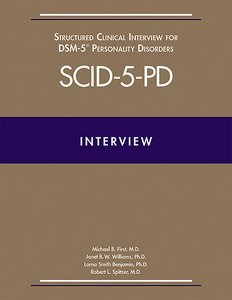
SCID-5-PD
The Personality Disorders Version (SCID-5-PD) is used to evaluate the 10 DSM-5 Personality Disorders. The SCID-5-PD name reflects the elimination of the multiaxial system in DSM-5. Although the DSM-IV Personality Disorder criteria are unchanged in DSM-5, the SCID-5-PD interview questions have been thoroughly reviewed and revised to optimally capture the construct embodied in the diagnostic criteria.
An optional self-report patient questionnaire for the SCID-5-PD is also included (SCID-5-SPQ). Designed to shorten the administration time of the SCID-5-PD, the SCID-5-SPQ is a screening tool with corresponding questions that allows for any “No” responses to be bypassed in the SCID-5-PD clinical interview.
Learn more
SCID-5-CT
The Clinical Trials Version (SCID-5-CT) is an adaptation of the SCID-5-RV that has been reformatted, streamlined, and optimized for use in clinical trials that incorporate typical inclusion and exclusion criteria. There are two options available for those interested in using the SCID-5-CT.
The first option is a uniquely customized version that conforms to the specific inclusion and exclusion criteria of a particular protocol. There is an additional customization fee for the contents of the SCID-5-CT to be uniquely tailored.
Alternatively, SCID-5-CT templates are available for several typical inclusion/exclusion criteria for various protocol designs. Specifically, SCID-5-CT templates are available for clinical trials with the following diagnostic inclusions: Schizophrenia, Schizophrenia/Schizophreniform/ Schizoaffective Disorder, Major Depressive Disorder, Recurrent Major Depressive Disorder, Acute Mania in Bipolar I Disorder, Bipolar Depression, and ADHD. An additional "exclusionary" SCID-5-CT is also available for studies in which the SCID-5-CT is used primarily to exclude individuals that have disorders listed in the exclusion criteria for the study (e.g., for diagnostic indications not included in the SCID-5-RV, like Major Neurocognitive Disorder).
Access a list of SCID-5-CT templates for various diagnostic indications Link
Each of the templates can be customized by the user. However if the template does not include evaluation of a particular disorder of interest (i.e., in either the inclusion or exclusion criteria), it is recommended that the user select the customized option so that this additional criteria can be incorporated into the SCID-5-CT.
For customization requests, a SCID-5-CT license must first be granted by and fully paid to the American Psychiatric Association Publishing. A separate customization fee is paid to Columbia University, Biometrics Research, Psychiatry.
Process a SCID-5-CT customization request Link
Customers can either commission to Columbia Psychiatry a customized SCID-5-CT for their protocol or they can customize it themselves starting with one of the eight templates listed above.
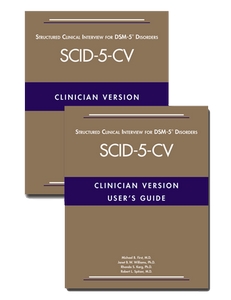
SCID-5-CV
The Clinician Version (SCID-5-CV) is published as a bound booklet and is an abridged and reformatted version of the SCID-5-RV for use by clinicians. It covers the diagnoses most commonly seen in clinical settings. Despite the "clinician" designation, the SCID-5-CV can be used in research settings as long as the disorders of particular interest to the researcher are among those included in the SCID-5-CV.
Learn more
SCID-5-RV
The most comprehensive version of the SCID-5, the Research Version (SCID-5-RV) contains more disorders than the Clinician Version or the Clinical Trials Version and includes all of the relevant subtypes and severity and course specifiers. An important feature of the SCID-5-RV is its customizability, allowing the instrument to be tailored to meet the requirements of a particular study.
The SCID-5-RV is available in two configurations:
- A standard "core" configuration that includes those disorders most researchers are likely to assess routinely for most studies. Learn more
- An "enhanced" configuration that includes the assessment of a number of optional disorders, in addition to the disorders from the core configuration. Learn more
To facilitate customization, the SCID-5-RV is not published as a bound volume but instead is available for licensing and provided as either non-modifiable PDF files, which can be printed out by the researcher, or modifiable Microsoft Word documents to meet the needs of a particular study; the modifiable version allows the researcher to remove unneeded elements (e.g., certain specifiers), alter the flow through the interview, or add additional scales (e.g., severity rating scales) of the researcher’s choosing.

QuickSCID-5
A fully structured diagnostic instrument that employs interview questions adapted from the Structured Clinical Interview for DSM-5 (SCID-5). The QuickSCID-5 is a briefer, more time-efficient version of the SCID designed to be administered usually in 30 minutes or less.
The shorter administration time results from the fact that QuickSCID-5 consists almost entirely of closed-ended questions that can be answered "YES" or "NO" by the patient, dispensing with the requirement in the standard SCID that the interviewer elicit descriptive examples and ask enough follow-up questions until the interviewer has enough information to determine whether the DSM-5 diagnostic criteria are met. Consequently, unlike the standard SCID, which requires the interviewer to have specialized training in diagnostic interviewing, QuickSCID can be administered by any clinician, including those in training.
QuickSCID has a modular design so that only modules of interest need be administered. Modules include an optional Overview, Module A (Mood Episodes and Disorders), Module B (Psychotic Symptoms Screen), Module C (Alcohol and Other Substance Use Disorders), Module D (Anxiety Disorders), Module E (Obsessive-Compulsive Disorder); Module F (Adult Attention-Deficit/Hyperactivity Disorder), Module G (Posttraumatic Stress Disorder), Module H (Eating Disorders), Module I (Screening for Other Disorders), and Module J (Rule Out Mental Disorders Due to a Medical Condition and Substance/Medication-induced Mental Disorders). In recognition of the fact that it is not recommended to make a diagnosis of a psychotic disorder such as schizophrenia using questions that can only be answered "YES" or "NO," QuickSCID-5 only screens for psychotic symptoms and is not intended to be used to diagnose psychotic disorders. These diagnoses are not included in QuickSCID-5.
Although the absence of a requirement for the interviewer to elicit descriptive examples may lead to more false positives than the standard SCID, the savings in administration time and its allowance for it to be administered by less trained interviewers can constitute a reasonable trade-off depending on the setting (e.g., for screening patients for the presence of a mental disorder).
Available as bound booklet or for licensing. Purchase of print book includes a license to photocopy for private clinical assessment use, up to 200 total copies per customer.
